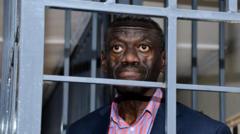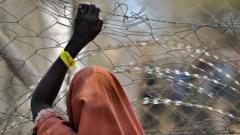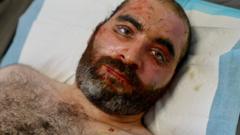Mykola Kulichenko's traumatic experience raises questions about Ukraine's draft system and the impact of personal history on military service.
Russia-Ukraine Conflict: The Dilemma of Drafting Survivors

Russia-Ukraine Conflict: The Dilemma of Drafting Survivors
The struggles of war-torn individuals amid ongoing mobilization policies
Mykola Kulichenko's harrowing story encapsulates the complexities of military service in a nation beleaguered by an ongoing war. Abducted and shot by Russian forces in 2022, Kulichenko was left for dead but managed to escape a gruesome fate by climbing out of his own grave—a traumatic experience that received significant attention in Ukraine. Not only did he survive, but he also returned to his farm in northern Ukraine, where he cares for his elderly father and raises livestock.
Despite this remarkable survival story, Kulichenko was recently summoned for military service as part of Ukraine's aggressive mobilization efforts. Having endured severe trauma and loss—his brothers were killed during the same incident—he questions the rationale behind sending him to the front lines. "What would it change if I go?" he pondered, emphasizing the futility he sees in sacrificing himself again given his past experiences.
Kulichenko's plight sheds light on a broader issue faced by many Ukrainian citizens who have survived the horrific fallout of war yet find themselves subjected to the country's military conscription. As the war with Russia drags on, the emotional and psychological toll of such mobilization efforts grows more pronounced. Many survivors grapple with their physical and mental health, raising ethical concerns about whom the government deems fit for service.
Compounding this painful contradiction is the sentiment among many Ukrainians that the realities of survival should be taken into account when considering military service. Kulichenko's story invites a deeper conversation about the responsibilities of a nation towards its civilians, particularly those who have endured tremendous hardship and loss.
In this climate, the challenges associated with the draft reflect a struggle not just for military readiness but also for the compassion and understanding of a society still navigating the repercussions of war. As Kulichenko contemplates his future, his narrative exemplifies the vital need for more nuanced approaches to military service in conflict zones, particularly for those who have already paid a steep price.
Despite this remarkable survival story, Kulichenko was recently summoned for military service as part of Ukraine's aggressive mobilization efforts. Having endured severe trauma and loss—his brothers were killed during the same incident—he questions the rationale behind sending him to the front lines. "What would it change if I go?" he pondered, emphasizing the futility he sees in sacrificing himself again given his past experiences.
Kulichenko's plight sheds light on a broader issue faced by many Ukrainian citizens who have survived the horrific fallout of war yet find themselves subjected to the country's military conscription. As the war with Russia drags on, the emotional and psychological toll of such mobilization efforts grows more pronounced. Many survivors grapple with their physical and mental health, raising ethical concerns about whom the government deems fit for service.
Compounding this painful contradiction is the sentiment among many Ukrainians that the realities of survival should be taken into account when considering military service. Kulichenko's story invites a deeper conversation about the responsibilities of a nation towards its civilians, particularly those who have endured tremendous hardship and loss.
In this climate, the challenges associated with the draft reflect a struggle not just for military readiness but also for the compassion and understanding of a society still navigating the repercussions of war. As Kulichenko contemplates his future, his narrative exemplifies the vital need for more nuanced approaches to military service in conflict zones, particularly for those who have already paid a steep price.





















